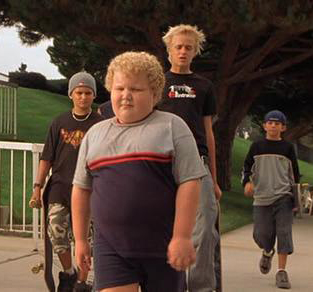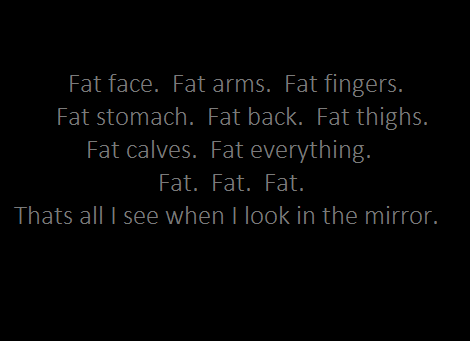
“I don’t want to be
fat anymore… I just want to be skinny forever… I feel guilty whenever I eat… If
I eat a lot I want to purge them… I don’t want to eat that it will just make me
fat…”
If you have a friend
who is already suffering from anorexia nervosa or bulimia nervosa, do you
usually hear those phrases from her? What do you feel when she utter those words?
Do you feel happy or sad? Do you pity or just support her? If you ever tried to
tell her to stop because anorexia nervosa/bulimia is really bad for her health,
what was her reaction? Girls who have anorexia nervosa always have the thinking
that if they eat something, it will make them fat already, so they are scared
to eat, they know to themselves that they should be skinny now and forever and
being skinny is their basis for the perfect body. On the other side, girls with
bulimia nervosa are also scared to put weights in their bodies so after they
eat a lot of foods, it would just be normal for them to go to the toilet and
purge the food they ate.
Anorexia nervosa
and bulimia nervosa are well-known eating disorders especially to girls but
boys can also develop these illness. Having anorexia and bulimia can be
developed from some reasons. If a girl is being teased or bullied because she
was fat or obese when she was young, she could start being body-conscious when she
becomes a teen, she would realize that being fat is embarrassing and people
will just always tease you. It can also be developed if a girl always sees or
watches models, actresses, and celebrities in televisions, magazines,
newspapers, and in social media. They will admire those models that have svelte
bodies. Since they admire and idolize models, they also want to have a body
like theirs. A body with no fats, very thin, and any clothes will fit and look
good on them. In order to be thin, these girls start to eat less and search in
the Internet some tips on ‘how to lose weight’ or ‘how to be skinny forever’.
They would already have clicked all the sites that seem helpful for them and
they would have started doing what they had read.
Aside from the psychological,
biological, emotional, and social factors, there is also a contributing factor
of eating disorders that affects many teenagers nowadays, and this factor is
the social media. I read an article Eating disorders soar among teens- and social media is to blame by Emily Dugan from the site independent.co.uk,
Dugan wrote, “The number of children and
teenagers seeking help for an eating disorder has risen by 110 percent in the
past three years, according to figures given exclusively to The Independent on
Sunday. ChildLine says it received more than 10,500 calls and online inquiries
from young people struggling with and weight-related anxiety in the last
financial year. The charity believes this dramatic increase could be attributed
to several factors, including the increased pressure caused by social media,
the growth of celebrity culture, and the rise of anorexia websites.”
 ChildLine is a
charity which is concern about counseling children and teenagers who have
eating disorders. People with eating disorders contact them to seek help from
them. They said that many girls had talked about the concerns they had about
their body image and how they dislike the way they looked. They also mentioned
how they compared themselves negatively with their peers and celebrities. Eating
problem become more significant once children and young people have reached
secondary school age. During 2012-2013, 96 percent of counseling about eating
disorders was with those between the ages of 12-18.
ChildLine is a
charity which is concern about counseling children and teenagers who have
eating disorders. People with eating disorders contact them to seek help from
them. They said that many girls had talked about the concerns they had about
their body image and how they dislike the way they looked. They also mentioned
how they compared themselves negatively with their peers and celebrities. Eating
problem become more significant once children and young people have reached
secondary school age. During 2012-2013, 96 percent of counseling about eating
disorders was with those between the ages of 12-18.
“Young
people suffering from anorexia often emphasized how they felt they would be
much happier and more accepted if they were slimmer. In other cases, young
people under-ate because it was something they could be in control of when
other things in their life were going
wrong.” ChildLine reported.
The most common
eating disorder of the children and teenagers are reported to be anorexia.
Anorexics are never contented with their bodies. They want to be slimmer and
thinner so that they would be much happier, and social media as the common
source of photos of models and celebrities is the one to be blamed for the unending
body dissatisfaction on children and teenagers.
Teenagers are the
most exposed to social media sites. They like looking at many photos of models
and celebrities and comparing themselves is automatic. Another article which
also blames social media for teenagers’ eating disorders is an article Socialmedia helps fuel some eating disorders by Marcela Rojas from the site
usatoday.com, Rojas said, “Social media,
where users exchange information and photos and communities from over common
interests, has become a bastion for some struggling with eating disorders.
Images of spindly legs, concave stomachs and jutting ribs emerge on various
sites by searching hashtags like #thinspogram #thighgap or #bonespo.”
The girls who see
those disturbing photos are often accompanied by even more shocking “thinspirational”
messages such as “pretty girls don’t eat”, “skip dinner, be thinner”, and “you
have to exercise for a week to work of the thigh fat from a single Snickers.” These
messages and photos are advocated by people who are known to be “pro-ana”
(pro-anorexia) and “pro-mia” (pro-bulimia). Pro-ana and pro-mia websites have
existed since the inception of Internet. But social media sites- Facebook,
Twitter, Tumblr, Instagram and Pinterest have given the communities a global
platform on which to share ideas and photographs. Users promote one another
self-destructive behaviors through shared tips and tricks and promote the
notion that an eating disorder is a lifestyle choice, not a serious mental
illness.
 I read an article Socia Networking Sites Promoting Eating Disorders by a staff reporter from natureworldnews.com,
the staff reporter wrote, “Experts say
that social media forces teen girls into adopting unhealthy eating habits that
often lead to eating disorders. A latest fad among teen girls is the thigh gap.
The impossible weight loss goal is to become so thin that there is a gap
between the thighs even when the feet are together. Apparently, the wider the
gap is the sexier is the person.”
I read an article Socia Networking Sites Promoting Eating Disorders by a staff reporter from natureworldnews.com,
the staff reporter wrote, “Experts say
that social media forces teen girls into adopting unhealthy eating habits that
often lead to eating disorders. A latest fad among teen girls is the thigh gap.
The impossible weight loss goal is to become so thin that there is a gap
between the thighs even when the feet are together. Apparently, the wider the
gap is the sexier is the person.”
According to health
experts, social media sites fuel such trends. A person needs to lose a large
amount of weight to achieve the kind of thigh gap that is being promoted. The
pictures of super-thin models with thigh gaps pressurize young girls into
achieving an impossible body shape. The
staff reported also wrote that there is as study conducted by researchers at
the University of Haifa reported in 2011 that teen girls who spent more time on
social networking sites had higher risk of developing eating disorders,
according to the Associated press. But, now social media sites discourage users
from posting pictures of self-harm, but the images still get through.
Teenagers who have
anorexia nervosa or bulimia nervosa and those who want to be anorexics and
bulimics are both exposed to social media sites. Most of the girls who have eating
disorders have joined a group known as the “pro-ana” and “pro-mia” that is a short
term for pro-anorexia and pro-bulimia. In an article Seeking ‘thinspiration’
by Jacqueline Head from the site news.bbc.co.uk, Jacqueline Head said, “ Pro-anorexia websites offering tips on
extreme dieting are nothing new, but their growth on social networking sites is
a disturbing new twist and brings them within reach of a wider audience.”
The author said
that websites that are offering tips on extreme dieting are not new but there
is an increase of growth in people who are seeking extreme diet tips to be thin
because of the popularity of social networking sites. The pro-anorexia and
pro-bulimia websites are advocates of these extreme dieting. Members of such
groups are posting pictures of painfully skinny girls for “thinspiration”,
comparing dangerously low goal weights and measurements, and are teamed-up to “keep
each other strong” in their quest to lose weight. Previously, people on such
internet groups remained anonymous, and the groups are sometimes hard to find.
But, on social networking sites, users have real names and faces, and are more accessible
than before. Such groups can be found in social networking sites, and the
biggest group is found in MySpace named Pro Ana Nation which has more than
1,000 members, and another group is Pro Extreme Dieting, which states: “we are
here to support each other in our choices, even if they are to recover, or try
to put on, or lose weight.” Facebook includes groups such as “Getting thin or
die trying”, “Yes, I have an eating disorder. No, it’s not your problem” and
other more groups.
Jacqueline Head
also stated in her article that a 21-year-old girl named Andrea Scheider from
Columbia, Missouri, has struggled with anorexia since she was 16. She used to
be a member of Pro-ana to seek justification for what she was doing.
“When
you are actively in your eating disorder, you desperately want someone to
understand, and a lot of times you find groups like the pro groups on Facebook
that are supportive of you continuing your eating disorder.”
Andrea says
Andrea wanted a
support from other people who are just like her, and luckily she had found a
group where she really belongs. She is in a middle of her eating disorder and
doesn’t want to give up. The group said that recovery is hard and staying sick
isn’t, so it’s easier to hide behind these sites claiming that she is making a lifestyle
choice, rather than admitting that she is sick and trying to get better. Andrea
said that they always want to be the thinnest and ‘thinnest is the winner’ is
the quote they live by.
There is an article
I read which also believes that pro-ana websites are seriously affecting a lot
of teen girls. It is an article by Sara Song entitled Health: Starvation onthe Web from the site content.time.com, Song wrote, “Click on “disclaimer” on the website ceruleanbutterfly.com and instead
of the standard fine-print legalese, you get a rant. “If you don’t have an
eating disorder, it says at one point, “I wonder what the bloody hell you’re
doing here. If you’ve come to yell at us, please realize that it’s pointless-
we’re going to ignore your point of view just as you ignore ours.”
 The creator of
Cerulean Butterfly- a site which deals frankly and approves with anorexia and
other eating disorder, is an intelligent San Francisco college student who asked
to be called Lizzy has been anorexic since 2002 and is candid about her belief
that eating disorder is less a disease than a lifestyle choice- a “decision to
pursue perfection”. Lizzy says that the mission of her website is to provide support
for people who already have eating disorders, not to encourage or promote
self-destructive behavior. She said that the term pro-ana is widely
misunderstood and misused. For many girls who are struggling with low self-esteem
and a negative self-image, the pro-ana sites can be seductive.
The creator of
Cerulean Butterfly- a site which deals frankly and approves with anorexia and
other eating disorder, is an intelligent San Francisco college student who asked
to be called Lizzy has been anorexic since 2002 and is candid about her belief
that eating disorder is less a disease than a lifestyle choice- a “decision to
pursue perfection”. Lizzy says that the mission of her website is to provide support
for people who already have eating disorders, not to encourage or promote
self-destructive behavior. She said that the term pro-ana is widely
misunderstood and misused. For many girls who are struggling with low self-esteem
and a negative self-image, the pro-ana sites can be seductive.
“The
anorexic voice inside my head seems to be winning.”
Lizzy says.
Although Lizzy
knows that many people especially doctors and health care professionals are
bashing the pro-ana and pro-mia websites, she still wants to believe in her
belief that eating disorder is not a disease or mental illness but a lifestyle
choice. Not only Lizzy the creator of a pro-ana website believes in it, but
also the people who are advocate of these groups and of course the members and
victims of anorexia or bulimia. For Lizzy, anorexics voices and feelings are
more important. She cares and supports for them and she wholly understands the
dangerous lives they are currently living in.
Social media is a
powerful factor which contributes to eating disorders because many people
especially teenagers are now addict in social networking sites. They are
happier when they chat with their friends, post statuses, upload photos, like,
comment, share, tweet, pin, and etc. Social media or social networking sites is
one of the source of happiness of teenagers and they are using it 24/7. In
social media, they usually see a lot of pictures being uploaded and shared. Girls
are automatically feeling bit envy toward girls they see that are more
attractive than them and they couldn’t blame themselves for having such a
feeling. Since they envy others’ looks especially their bodies, it can
sometimes lead a girl to develop an eating disorder. Eating disorders are
becoming more popular because of the help of pro-ana and pro-mia sites. Girls
who have anorexia or bulimia are attracted to join in pro-ana and pro-mia
groups since they feel belong and they are being understood by these groups. These
groups are not just attracting girls who already have eating disorders but also
girls who want to be thin and skinny. In spite of the very risky like they are
in, pro-ana and pro-mias are aware of the people who contradict and continually
argue with their belief. They know they are wrong but for them, being a pro-ana
or pro-mia will not make them weak of their eating disorder but instead it will
make them stronger.
































